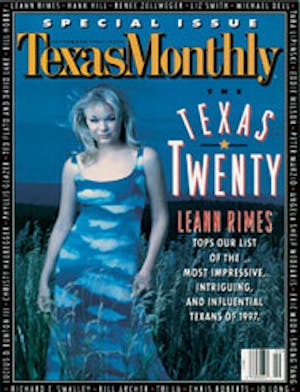YOU CAUGHT ME on a very good day,” Lucius D. Bunton III says with a raspy laugh, eyes twinkling as he sits robeless in his office adjacent to the courtroom in Pecos this past June. He had just learned that the U.S. Supreme Court had affirmed his 1995 opinion in City of Boerne v. Flores (in which his court struck down the federal Religious Freedom Restoration Act as unconstitutional), reversing Judge Patrick E. Higginbotham of the Fifth U.S. Circuit Court of Appeals. “I’m kind of on a high.”
Truth be told, we caught Bunton, a senior judge of the U.S. District Court for the Western District of Texas, in the middle of a pretty good year, one in which his influence was felt far beyond the Trans-Pecos. Hearing the Supremes sing his song is a pleasant change for the judge, no stranger to being overruled by the conservative Fifth Circuit Court in New Orleans. Then there’s the recently completed $19.6 million Lucius D. Bunton III United States District Courthouse in Pecos, where his name is literally etched in stone above the door. (His district, one of four federal judicial districts in Texas, runs from El Paso into East Texas and includes San Antonio, Austin, and Waco.) Most notably, the judge left his mark on the Texas Legislature. This session’s passing of the first-ever comprehensive water bill and the previous session’s creation of the Edwards Aquifer Authority to regulate the pumping of underground water were pushed through with the knowledge that if the Lege wouldn’t act, Bunton would. “I’m not going to take credit for that, but I encouraged some years ago, long before this water bill and the aquifer authority, that the Legislature do something. The State of Texas ought to do something. This is a step in the right direction.”
Born in Del Rio, raised on a ranch southwest of Marfa, and living in the same modest Odessa home for the past 35 years, the 72-year-old Bunton has never been one to shy away from controversy. In 1989 he determined that the FBI did indeed discriminate against Hispanic agents. “It wasn’t a popular decision,” he concedes. “But I didn’t do it to be popular or unpopular. Every time you make a decision, you’re going to make somebody happy and somebody unhappy.”
Bunton’s reputation within legal circles is not that of an activist judge in the mold of William Wayne Justice nor a legal scholar such as his colleague Harry Hudspeth, but that of an efficiency expert with a low tolerance for BS. Before he became a senior judge in 1992 (he was appointed to the Western District in 1979 by Jimmy Carter), his letterhead identified his court as the Rocket Docket, and he still runs one of the fastest courts in law. Bunton permits lawyers to approach the bench or a witness but once, and he has been known to shoot offensive attorneys with a water pistol. “I hate to waste jurors’ time, my time, lawyers’ time,” he says, lamenting what he sees as the crippling of the legal system. “A lot of state court judges don’t push their dockets, for whatever reason. I don’t think they’re necessarily lazy, they just don’t want to incur the wrath of people who are going to elect them. But it can be done.”
In Pecos he’s a local hero for getting the courthouse built despite objections from officials of the Drug Enforcement Administration, the U.S. Border Patrol, and public defenders and attorneys from El Pasomany of whom complained about the town’s remote location. Texas Lawyer even titled a 1995 article on the project “Bunton’s Boondoggle.” Bunton remains unswayed. “Congress said we’d have court in Pecos. That’s the statute, and I’m not about to change it. I think this is a fairly central location for the ten-county [Pecos Division] area. This is where Congress said we’d have the Pecos Division.”
And so legal opinions will continue to be issued from this town of 12,361, some of which will echo throughout the state and the nation, most of which suggest that common sense, a trait inherent to the region, still has a fighting chance of prevailing over big-city politics and lawyers. “I like West Texas,” Lucius Bunton says with a hint of pride, noting that except for college and a world war, he has never lived anywhere but here. “Where else can you get up in the morning and see clear from yesterday to tomorrow?” And where else can you find a judge like Lucius Bunton?
- More About:
- Politics & Policy
- Pecos
- Odessa







